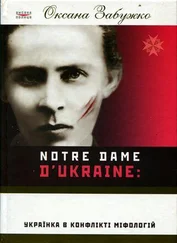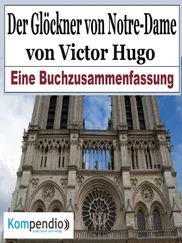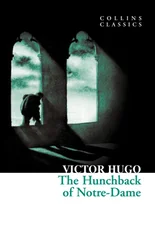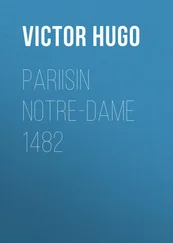Elena Chudinova
THE MOSQUE OF NOTRE DAME
INTRODUCTION
TO THE AMERICAN EDITION
I am very happy to introduce my book to American readers. This year The Mosque of Notre Dame turned ten years old. So far, it has been published in Russian, Serbian, Polish, Bulgarian, Turkish, and French, and translated into Norwegian. I find it hard to express my appreciation to all the novel’s friends and supporters, whose selfless efforts have made it possible for the book to reach countless new readers around the world.
Still, I am sometimes enveloped by a sense of gloom. I am terrified that we are losing precious time. The danger described in The Mosque of Notre Dame grows every day.
I began writing this novel after the fall of the Twin Towers in 2001, but before the mass murder of schoolchildren in the Russian city of Beslan by Islamic terrorists in 2004. Do most Americans even know about the horrible tragedy of Beslan—those three days during which all Russians sat, glued to their television screens, praying? Chechen Muslim terrorists had attacked a village school and kidnapped more than 700 children, imprisoning them in a stuffy gymnasium built to accommodate 100 people. Before the suspense and horror ended, 333 people, including rescuers, were murdered. Half of those killed—186 of them—were children as young as 9 years old.
If facts cannot be silenced, they still can be distorted. Do Russians know about the fall of the Twin Towers? Definitely. But how many bizarre Russian versions of this event have I heard over the years, according to which the Towers were toppled by “non-Muslims”? For some reason, someone is very interested in preventing discussion about the threat to our civilization posed by Islamic occupation.
The character of Sophia, the principal heroine of my novel, appeared in my imagination after I read a news story about a twelve-year-old Russian girl, the daughter of a businessman, who was kidnapped by Chechen bandits. The girl was held for more than six months and was tortured and abused. To speed the father’s ransom payments, the kidnappers cut off two of her fingers. Eventually, the girl was rescued and the kidnappers arrested.
An American offered to pay for the girl’s rehabilitation at a U.S. clinic—since all her family’s resources had been spent on her ransom. But the rescued girl was refused entry to the United States by the State Department. Strangest of all, the story of this poor, wounded girl being barred entry by the usually generous U.S. government went virtually unreported in America’s news media.
It is worth noting that, at the time, many people in the West had been making excuses for the Chechen criminals. So perhaps it was inconvenient that, unlike mere words, a maimed child’s injuries offer incontrovertible evidence of the depravity of the people the Western press likes to call Muslim “militants.”
A thought crossed my mind: If there is no justice in this world, will this girl seek vengeance when she grows up? As it turned out, she chose another, better path. That is why I do not mention her name. But as the story develops in my novel, the heroine chooses vengeance—a lonely, bitter path.
Most of the large-scale events the book describes have not yet taken place in our world. The European Union has not turned into Eurabia— so far . For now, vineyards have not been cut down. The great paintings of Western art have not been burned. And the magnificent Cathedral of Notre Dame has not been turned into a mosque. But how the year 2048 will turn out for Europe and the West depends on us.
This book must be read today, because tomorrow may be too late.
Elena Chudinova Calvados, France – Moscow, Russia IV August Anno Domini MMXV
CHAPTER 1
ZEYNAB’S LAST SHOPPING TRIP
Eugène-Olivier walked down the Champs-Élysées as fast as his uncomfortable clothing would allow. He certainly was not running—someone running would only draw attention. But his pace was faster than if he had been running. Besides, few runners could run for six hours without a break. Eighteen-year-old Eugène-Olivier could walk all around Paris this way without stopping. It seemed that he had just passed through the Jardin du Luxembourg when already, the Bridge of Invalids was also behind him and the Champs-Élysées sparkled right and left—from lights in store window displays and through the draped windows of private residences. There were not many residences in the Champs-Élysées; there were many more stores like the one he was now approaching.
* * *
Zeynab set out from her house on foot. She had never heard the word “Impressionism” in her life. Thus the play of gold and blue light that bathed Paris that sunny afternoon in early spring could hardly have inspired her imagination. It was pleasant, but not nearly so pleasant as the fact that her husband did not limit her shopping expenditures. And today there was going to be a fashion show in the women’s department of the big department store on the Champs-Élysées.
It was not quite right, of course, for her to go to the store alone, but even the Religious Guard closed its eyes to the fact that this rule was regularly violated in the richest neighborhoods and in the poorest. With the poor, all the men in the family had to work while the women rushed around from store to store looking for a cheaper piece of mutton.
In the rich neighborhoods, if you couldn’t disregard the rules others were obliged to follow, what would be the pleasure in being a man of influence? Even the Religious Guard understood these fine points. Only ordinary people were not exempt from following the rules.
Of course, it was always best to be prudent. For example, Zeynab went shopping alone—but Qadi Malik would later pick her up from the store, so in a sense she was simply going to meet her husband.
Zeynab had only crossed from the Quai d’Orsay over the Emirates Bridge and onto the Champs-Élysées, when she stopped.
Translucent rainbows flashed on the window displays, drawing attention to three-piece suits of soft black wool, light-colored suits of silky linen for seaside vacations, snowy white silk poplin and thin linens, colorful polo shirts, cashmere overcoats, Moroccan leather shoes next to curved ivory shoehorns, tie clips and pins, hand sewn neckties, heavy bracelets of Swiss wristwatches, rings and gloves, engraved and gem-encrusted canes—simply everything a man could wish for.
The ladies’ department, understandably, was invisible from the street, its treasures hidden behind reflective glass, hidden like Ali Baba’s cave. Zeynab did not hurry in to see them as usual; she was enjoying the fine weather. When she was finished, she would have to call Malik on his cell phone. And with him she would observe the glory of the spring day from behind the closed windows of the Mercedes. The windows of the Mercedes were tinted, of course; you could stare as much as you liked and no one would look back.
What a beautiful day! Not even the poor, whining incessantly over their begging bowls, managed to annoy her, nor did the piercing whistles and loud screams of children playing. Soft pies shone white in the hands of street vendors and passed in the blink of an eye into the hands of buyers. Loose couscous sparkled as it leapt from the boiler into small paper bags. Flies greedily circled above the baklava and Turkish delight, as customers in street cafes alternately sipped steaming black brew and ice water. How beautiful the Champs-Élysées was in spring!
For some reason, everyone seemed to be hurrying toward the Arc de Triomphe. How interesting, what could be going on there?
Eugène-Olivier stopped so suddenly in front of the neon sign of the department store that he almost knocked over a pudgy woman. This was bad, very bad—he hadn’t calculated the time properly. Whoever arrived too early could also arrive too late. Sevazmios always appeared everywhere on time, to the minute.
Читать дальше
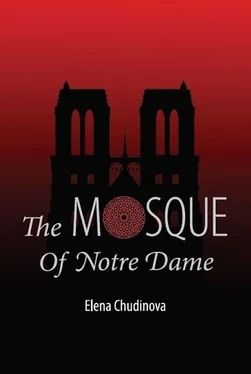

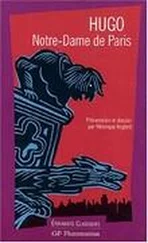
![Виктор Гюго - Собор Парижской Богоматери [Notre-Dame de Paris]](/books/30985/viktor-gyugo-sobor-parizhskoj-bogomateri-notre-thumb.webp)

